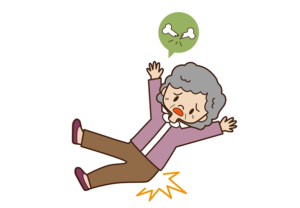Fall Prevention
 Falls and Older Adults: There IS something you can do
Falls and Older Adults: There IS something you can do
by Jane French
Most adults envision retirement age as a chance to pursue new interests, careers, volunteering, and travel. As people age, however, the likelihood of sustaining an injury as a result of a fall increases. More than 95% of hip fractures are caused by falling – usually by falling sideways – and falls are also the most common cause of traumatic brain injuries (TBI). One out of five falls experienced by older adults causes a serious injury, making it hard for a person to get around, do everyday activities, or live on their own. Even if they’re not injured, many people become afraid of falling and cut down on everyday activities. Ironically, when older people are less active, they become weaker, thus increasing the chances of falling.
The good news: Research shows that falls are not an inevitable part of aging. There are things people can do to reduce falls and maintain an active, engaged lifestyle:
- Eliminate the most common causes of falls
- Commit to good balance, in addition to cardio and strength training
Eliminate the most common causes of falls:
- Remove clutter and tripping hazards to make your home safer.
- Get your vision checked regularly.
- Talk to a doctor about any dizziness. Don’t assume you have to live with it.
- Choose the right shoes and wear them in the house.
- Make sure you’re using your cane or walker correctly.
Commit to good balance:
Some people think that they are protecting themselves by using treadmills for cardio exercises and other machines for strength training. However, by holding on to machine handles and bars, they reduce their ability to balance and avoid falls. Balance training, practiced separately from machine exercises, is now recognized as integral to fall prevention programs.
One such program, recommended by the Washington State Department of Health and the National Council on Aging, is Tai Chi Quan: Moving for Better Balance. Based on Tai Chi, it is a stand-alone course designed to improve balance recovery. Jan Voit, a Seattle-area physical therapist who trains instructors to teach Tai Chi Quan to older adults, notes that no matter our age, we all have the same responses to losing balance, but that these responses decrease with age. When older adults sense a loss of balance, they frequently react by withdrawing into an ever-shrinking space. Progressive exercises that make legs stronger and improve balance help overcome this response. “By learning to catch yourself (balance recovery), you can increase your world of control,” says Voit.
There is something you can do:
Falls and fear of falling are a genuine concern, often with long-term, negative effects. The good news is that falls don’t have to be an inevitable part of aging. By making a lifestyle commitment to balance, in addition to following simple steps to reduce risks, older adults can focus on all the amazing interests and activities life has to offer.
Jane French is a Chicago area freelance writer, with a professional background in nonprofit operations. She serves on the Naperville Senior Task Force and volunteers for Ride Assist Naperville. She has been a caregiver for family members and speaks to issues regarding this growing segment of our population. You can learn more about her work at www.janedfrench.com.
Further Resources:
AARP: New Thinking on Avoiding Deadly Falls and Simple Steps to Prevent Falls
Centers for Disease Control and Prevention (CDC): National Center for Injury Prevention and Control, Division of Unintentional Injury Prevention. “Important Facts about Falls,” February 10, 2017.
National Council on Aging (NCOA): Evidence-Based Fall Prevention Programs
National Institute on Aging (NIA): Exercise and Physical Activity: Getting Fit for Life
National Institute of Health (NIH): Falls and Fall Prevention
Voit, Jan, PT: Tai Ji Quan: Moving for Better Balance Trainer
Tai Chi Quan: Moving for Better Balance
Washington State Department of Public Health: Fall Prevention Resources
Inclusion in this list does not imply endorsement.
